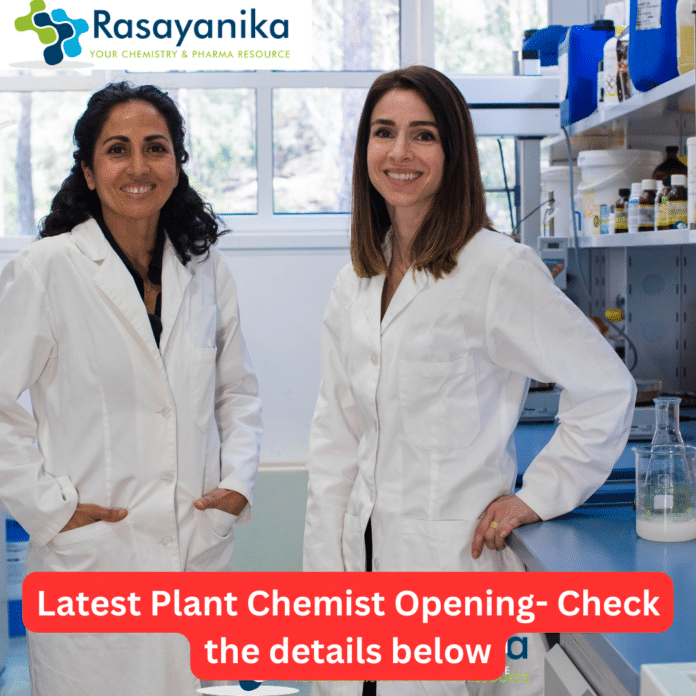Plant Chemist – Dyes Industry opening for BSc Chemistry Chemical engineering. Apply now online. Check the details below for the Latest BSc Chemistry Opening. Hridhan Chem Private Limited careers.
Position – Plant Chemist – Dyes Industry
Location – Umargam, Gujarat, India
Job description – As a Plant Chemist in the dye industry, An employee should oversee various aspects of dye synthesis, formulation, testing, and troubleshooting to ensure consistent and high-quality dye products are produced following industry standards and regulatory requirements.
Responsibilities :
- Monitor and control dye production processes, ensuring they run efficiently and effectively.
- Strong working knowledge of various types of reactors (Glassline, stainless steel, mild steel with rubber lining, HDPE lined) filter presses, centrifuges, scrubbers, blenders, and related equipment/ Machinery.
- Optimize process parameters to maximize yield, minimize waste, and improve product quality.
- Develop and adjust dye formulations based on product specifications and customer requirements.
- Carry out dye synthesis using appropriate equipment and techniques, ensuring accurate measurement and adherence to safety protocols.
- Perform regular quality control checks on raw materials, intermediates, and finished dye products.
- Identify and address process deviations, anomalies, and quality issues promptly.
- Collaborate with cross-functional teams to diagnose and resolve production-related problems.
- Adhere to safety protocols and guidelines to ensure a safe working environment for yourself and your colleagues.
- Stay up-to-date with industry regulations and standards to ensure compliance with all relevant requirements.
- Maintain accurate records of production activities, test results, and quality control data.
Qualifications and Requirements:
- Bachelor’s or Master’s degree in Chemistry, Chemical Engineering, or related field.
- Strong knowledge of dye chemistry, dye synthesis techniques, and color theory.
- 2-6 Years of Experience working in a chemical manufacturing environment, preferably in dye production.
- Proficiency in using various analytical instruments and techniques for quality control.
- Knowledge of safety protocols and practices within a chemical production setting.
- Excellent problem-solving skills and the ability to troubleshoot process issues.
- Strong attention to detail and accuracy in data recording and analysis.
- Practical communication skills and the ability to work collaboratively in a team environment.
- Familiarity with relevant regulatory standards and compliance requirements
How to apply – Mail us directly on : disha@hridhanchem.com
APPLY VIA YOUR LINKEDIN ACCOUNT
Hello there, dear friends! We’ve compiled a set of interview questions and their corresponding answers to assist you in your interview preparation for the Latest BSc Chemistry Opening. Utilize this valuable resource to ensure your success during the interview for the Latest BSc Chemistry Opening.
1. Can you describe your experience with optimizing dye production processes for efficiency and quality?
Answer:
In my previous role as a Plant Chemist, I actively monitored and controlled dye production processes to ensure they ran efficiently and met quality standards. I consistently optimized process parameters to maximize yield, minimize waste, and improve product quality. This involved regular data analysis, experimentation, and collaboration with the production team. By implementing process improvements, I was able to enhance productivity and reduce production costs while maintaining high-quality dye products.
2. How familiar are you with various types of reactors and related equipment commonly used in dye production?
Answer:
I have extensive experience working with a variety of reactors, including Glassline, stainless steel, mild steel with rubber lining, and HDPE lined reactors. Additionally, I am well-versed in operating filter presses, centrifuges, scrubbers, and blenders commonly used in the dye manufacturing process. This familiarity with different equipment allows me to adapt to various production environments and troubleshoot effectively when needed.
3. Can you provide an example of a situation where you had to adjust dye formulations to meet specific product specifications or customer requirements?
Answer:
Certainly. In a previous role, a customer requested a custom dye formulation with specific color characteristics and fastness properties. I worked closely with our R&D team to adjust the formulation, conducting several trial runs to achieve the desired color and performance attributes. Through careful experimentation and analysis, we successfully developed a customized dye solution that met the customer’s requirements, resulting in a satisfied client and ongoing business partnership.
4. How do you ensure compliance with safety protocols and guidelines in a chemical manufacturing environment?
Answer:
Safety is paramount in a chemical manufacturing setting. I make sure to adhere to safety protocols and guidelines rigorously. This includes wearing appropriate personal protective equipment (PPE), participating in safety training programs, and conducting regular safety audits and inspections. I also encourage a safety-conscious culture among colleagues by promoting open communication about potential hazards and near-miss incidents. Safety is a collective responsibility, and I take it seriously to ensure a secure working environment for everyone.
5. How do you stay updated with industry regulations and standards relevant to dye production?
Answer:
I stay up-to-date with industry regulations and standards by regularly reviewing and following industry publications, such as trade journals and websites. I am also an active member of industry associations and networks, which provide valuable updates on regulatory changes and best practices. Attending relevant workshops, seminars, and conferences is another way I stay informed about the latest developments in the dye industry. This proactive approach ensures that I can adapt to evolving regulations and maintain compliance in my role as a Plant Chemist.
















































